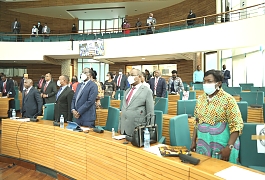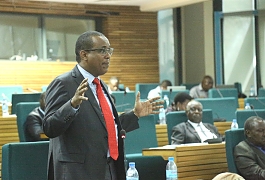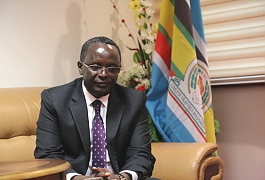The Chairperson of the East African Community Council of Ministers, Hon. Dr. Diodorus Kamala has disclosed that the Council will present the revised EAC Anthem to the 12th Summit of the EAC Heads of State scheduled for November 2010, for consideration and adoption.
Hon. Dr. Kamala, who was responding to questions from Honourable Members of the East African Legislative Assembly sitting concluded last week in Kigali, Rwanda also apprised the House of progress registered in the railways and energy sectors in the Community.
Finalisation of the EAC Anthem
Responding to a question raised by by Hon. Dora C. Kanabahita Byamukama (Uganda) as to when the EAC Anthem is to be finalised, Hon. Dr. Kamala informed the august House that the development of the EAC Anthem had been an ongoing process since 2005.
The 7th Summit of the Heads of State, held in April 2006, after listening to the first submission of the EAC Anthem proposal directed the Secretariat to develop an anthem with a motivational message and tune in consonance with the Partner States’ enthusiasm for enhanced integration; and more than one song to provide the Council and the Summit a reasonable range from which to choose a suitable anthem.
The Minister noted that subsequently, the EAC Anthem proposal had undergone a number of revisions and twice (June 2007 and November 2008 in Kampala) was presented and deferred by Summit for further improvement. The third and most recent was during the 11th Summit of Heads of State sitting in Arusha on 20 November, 2009. The Summit after considering the Anthem proposal directed the Council to further develop the proposed EAC Anthem into a motivational song using the existing text/words and re-submit for Summit’s consideration.
The process of developing the EAC Anthem so far had cost the Community USD 411,042 and the projected budget for finalising the process during FY 2010/2011 is USD 129,500.
The proposed Anthem has three verses and a chorus in Kiswahili which highlights the essence of the East African society, its prominence, aspirations and its desire to be united, prosperous and stable.
The Secretariat has developed a programme for implementation of the review process to make the Anthem ready for consideration by the EAC Heads of State Summit in November 2010.
Improving EAC Railway Systems
On plans and steps that Partner States are undertaking to make their railways more efficient and competitive through autonomous management and improvement of infrastructure, Dr. Kamala disclosed that during the period 2006-2007, the three Partner States of Kenya, Uganda and Tanzania privatised their railways operations through long-term concessions.
The joint Kenya and Uganda Railways operations went to Sheltam of South Africa under the business name of Rift Valley Railways while the Tanzania Railways operations were handed to RITES of India. The Minister noted that the performance of the concessionaires had been the subject of public debate but overall, the privatisation exercise did not yield the expected results of enhancing cargo transport by rail.
He informed the august House that the Tripartite Task Force of the Chief Executives of the COMESA, EAC and SADC Secretariats had realised that concessioning had remained a problem in all the three regions as none of the currently operating concessions had registered any meaningful success.
In this context, the Tripartite Task Force had directed the development of a model concession agreement that will be sufficiently plug the loopholes that the concessionaires had and in some cases the States had capitalised on not to fulfil their obligations. The development of this agreement is ongoing under the North-South Corridor Aid for Trade programme.
The Chairperson of the Council disclosed that the East African Railways Master Plan, taking into account the Summit directive on the conversion of the narrow gauge railways to standard gauge, when implemented will address issues related to legal and institutional framework, traffic projections, technical and operational hence improve railways performance in East Africa.
The EAC Council of Ministers has approved the establishment of a railways regulatory authority at the regional level to coordinate among other issues competition, exchange of equipment, policy development, and investment. The Hon. Ministers of Finance have committed to set aside resources for the detailed design of the standard gauge prioritised East African railways network. The financing proposal is to be considered in May 2010 during the EAC Pre-Budget Consultations.
Exploiting EAC Energy Resources
On the issue of promoting the efficient exploitation, development, joint research and utilisation of various energy resources available within the region, the Chairperson of the Council of Ministers informed EALA that Partner States had taken on several initiatives including the East African Power Master Plan (EAPMP) which was developed to identify least cost power development options for the region.
Hon. Kamala noted that since the Master Plan was developed in 2005 before Rwanda and Burundi had joined the EAC, the plan was being updated to include the two Partner States and to take account of other developments in the power sector.
He informed EALA that joint promotion of the region for exploration and development of oil and gas through the East African Petroleum Conferences and Exhibitions was being held biannually and hosted on a rotational basis by the EAC Partner States.
The Cross-Border Electrification Programme is ongoing; where towns in the different Partner States get their electricity supply from the grid that is nearest to them, for example Lunga Lunga in Kenya is supplied from Tanzania under this arrangement and had operated successfully since 2004 while Namanga-Tanzania was linked to the Kenyan system in April 2009.
Other projects earmarked for implementation under this programme include Lwakhakha (Uganda) from Lwakhakha (Kenya), Mutukula (Tanzania) from Mutukula (Uganda) and Murongo (Tanzania) from Kikagati (Uganda). Projects for Rwanda and Burundi were being identified and more projects were expected after completion of rural electrification master plans that Partner States were developing under their Rural Electrification programmes.
The EAC was also developing a Cross-Border Electrification Policy and Model Power Supply Agreement. The proposed policy will also address exploitation and development of trans-boundary renewable energy resources.
Preparatory studies for a natural gas pipeline from Dar es Salaam to Tanga and Mombasa are expected to start in May 2010. In addition, plans were in place to extend the existing oil products pipeline from Kenya to Uganda, Rwanda and Burundi.
A Regional Refineries Development Strategy was completed and approved by the Sectoral Council on Energy in April 2008. The Strategy also addresses development of petroleum storage and distribution infrastructure to enhance availability, reliability and efficient distribution of petroleum products in the region. In addition, an Emergency Petroleum Supply Plan (EPSP) was approved by the Council at its 19th Meeting held in November 2009. The EPSP will be used to govern distribution of petroleum products in the event of an emergency or disaster affecting their supply in a Partner State.
A Regional Strategy on scaling up access to modern energy services has been developed and Terms of Reference and provisional budgets for the development of the Renewable Energy, Energy Conservation and Energy Efficiency Master Plans estimated to cost US$ 1.2 million; and Fossil Fuels Master Plan estimated to cost US$ 1.5 million have been finalised and will be implemented once funds have been sourced.
For clarification/enquiries, please contact:
Owora Richard Othieno
Ag. Head of Department
Corporate Communications and Public Affairs
Phone: +255 784 835021
Email: othieno@eachq.org
Department of Corporate Communications and Public Affairs
EAC Secretariat
Arusha, Tanzania



